Reinforcement Learning-Based Online Estimation of the Inductances of the Permanent Magnet Synchronous Machines
IF 5.9
2区 工程技术
Q1 ENGINEERING, ELECTRICAL & ELECTRONIC
IEEE Transactions on Instrumentation and Measurement
Pub Date : 2025-08-29
DOI:10.1109/TIM.2025.3604136
引用次数: 0
Abstract
This article proposes a novel method to estimate the基于强化学习的永磁同步电机电感在线估计
提出了一种基于强化学习(RL)算法的永磁同步电机d轴和q轴电感估计方法。在线电感估计的主要挑战是逆变器的非线性和机器电感对工作d轴和q轴电流的复杂依赖。开发并训练了前馈神经网络(FNN)来补偿逆变器在测量的d轴和q轴电压中的非线性。开发并训练了基于双延迟深度确定性(TD3)策略梯度rl的估计器,使用补偿的d轴和q轴电压、测量的d轴和q轴电流以及转子转速实时识别机器电感,通过更新数据进行再训练,可以高度灵活地适应系统在运行过程中的变化。实验验证了该方法在满载变化、磁场减弱和转速变化等关键工况下具有较高的估计精度。仿真和实验结果表明,该方法优于传统的递推最小二乘(RLS)和Adaline神经网络(ANN)方法,估计精度提高10%以上,增强了对逆变器非线性的鲁棒性。
本文章由计算机程序翻译,如有差异,请以英文原文为准。
求助全文
约1分钟内获得全文
求助全文
来源期刊

IEEE Transactions on Instrumentation and Measurement
工程技术-工程:电子与电气
CiteScore
9.00
自引率
23.20%
发文量
1294
审稿时长
3.9 months
期刊介绍:
Papers are sought that address innovative solutions to the development and use of electrical and electronic instruments and equipment to measure, monitor and/or record physical phenomena for the purpose of advancing measurement science, methods, functionality and applications. The scope of these papers may encompass: (1) theory, methodology, and practice of measurement; (2) design, development and evaluation of instrumentation and measurement systems and components used in generating, acquiring, conditioning and processing signals; (3) analysis, representation, display, and preservation of the information obtained from a set of measurements; and (4) scientific and technical support to establishment and maintenance of technical standards in the field of Instrumentation and Measurement.
 求助内容:
求助内容: 应助结果提醒方式:
应助结果提醒方式:


